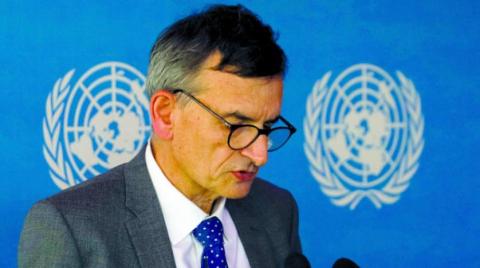
In this file photo, Russia"s President Vladimir Putin and US President Donald Trump are seen during the G20 summit in Buenos Aires, Argentina November 30, 2018. (Reuters)
President Donald Trump last week announced that he would first suspend and then, after six months, cancel the Intermediate-Range Nuclear Forces (INF) Treaty between the US and Russia. The treaty was signed on Dec. 8, 1987, by President Ronald Reagan and his Russian counterpart Mikhail Gorbachev in Washington. It aimed to restrict missiles with a range of between 500 and 5,500 kilometers. The treaty was a major step in limiting the arms race between the US and the then-Soviet Union. By 1991, 2,700 weapons had been destroyed. The INF treaty definitely made Europe a safer place.
Trump cited Russian violations of the treaty as the reason for his course of action. The Novator 9M729 or SSC-8 weapon is a particular bone of contention for the US. As so often, the president may have a point, but the ramifications of his actions may go beyond what he expected.
Russia had undeniably violated the treaty. The US is, however, also working on revamping its nuclear arsenal — a course of action that was initiated under the Obama administration. Barack Obama repeatedly butted heads with Russian President Vladimir Putin over the INF.
Where Trump certainly had a point is that the treaty hamstrung the US armed forces, whereas nuclear powers other than the US and Russia, especially China, were free to develop and deploy their intermediate-range nuclear weapons.
The willingness to look at a nuclear arsenal for tactical reasons should worry all countries neighboring nuclear powers.
Cornelia Meyer
Russia was quick to respond: Foreign Minister Sergei Lavrov announced that Russia would follow suit and also suspend the treaty in order to cancel it in six months’ time. Defense Minister Sergei Shoigu announced that Moscow would now be free to develop a new land-based fleet of intermediate-range nuclear weapons over the next two years.
The former First Sea Lord (head of the UK’s Royal Navy) and former Parliamentary Undersecretary of State at the British Home Office (anti-terrorism czar) Adm. Lord Alan West said he personally regretted the course of action taken by Trump, which seemed to be the end of the INF. While he acknowledged that Russia had violated the treaty, he felt it was better to stay engaged rather than go their separate ways and lose all control and visibility over what happened in Moscow.
West added that he was concerned that both Russia and the US were willing to see nuclear weapons as tactical instruments in case of a war. He feels that nuclear weapons should serve one purpose and one purpose only, which is as the ultimate deterrent and the last line of defense.
He has a point, looking at it from a European perspective or, for that matter, from the perspective of other densely populated areas, which could potentially serve as theaters of wars fought with nuclear weapons. The memory of Hiroshima and Nagasaki may have become distant. Still, the bombs caused utter devastation and loss of human life. The new generation of weapons will be even more powerful.
The willingness to look at a nuclear arsenal for tactical reasons should therefore worry all countries neighboring nuclear powers. They have no say over when big powers decide to use the full might of their arsenal. Treaties regulating or limiting the use of nuclear weapons are designed to make the world a safer place. While the UN Treaty on the Non-Proliferation of Nuclear Weapons is still in force, more and more countries have started to ignore it — India and Pakistan being a case in point.
In the end, Europe — and with it maybe the world — have not become a safer place with the cancellation of the INF treaty, because the US and Russia lose the ability to monitor and contain the spread of each other’s nuclear arsenal (the two countries had already done away with the Anti-Ballistic Missile Treaty in 2002). While these treaties may not be perfect, and cheating on them seems to be a sport, it is better to engage and keep each other in check than opt for a fully-fledged arms race. Nothing less than the future of humanity may be at stake here, given the power of nuclear weapons.
Cornelia Meyer is a business consultant, macro-economist and energy expert. Twitter: @MeyerResources
Disclaimer: Views expressed by writers in this section are their own and do not necessarily reflect Arab News" point-of-view












